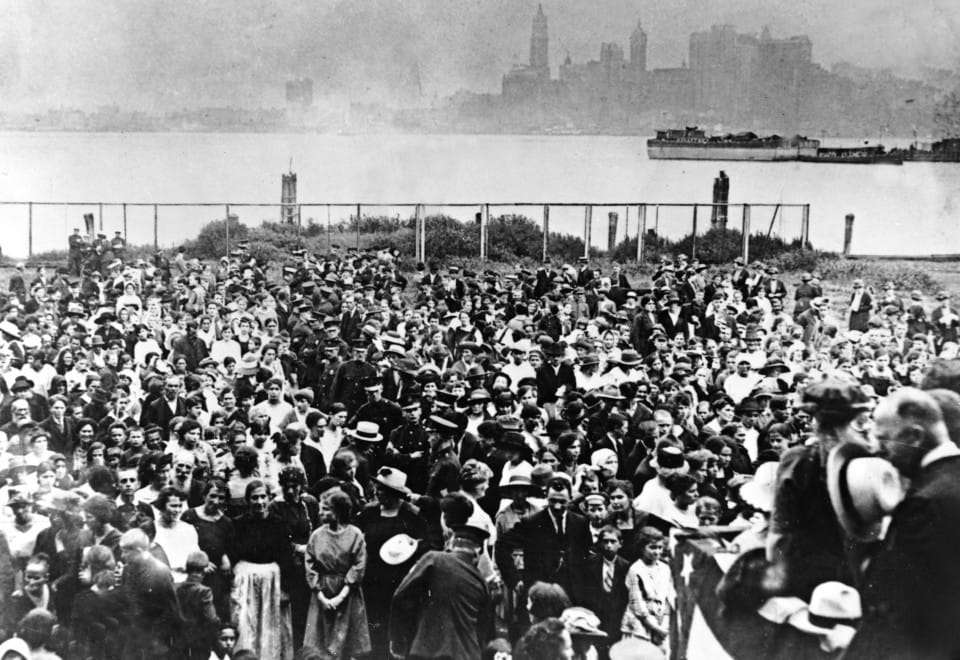The Volokh Conspiracy
Mostly law professors | Sometimes contrarian | Often libertarian | Always independent
Sorry, but the Irish were always 'white' (and so were Italians, Jews and so on)

"Whiteness studies" is all the rage these days. My friends who teach U.S. history have told me that this perspective has "completely taken over" studies of American ethnic history. I can't vouch for that, but I do know that I constantly see people assert, as a matter of "fact," that Irish, Italian, Jewish and other "ethnic" white American were not considered to be "white" until sometime in the mid-to-late 20th century, vouching for the fact that this understanding of American history has spread widely.
The relevant scholarly literature seems to have started with Noel Ignatiev's book "How the Irish Became White," and taken off from there. But what the relevant authors mean by white is ahistorical. They are referring to a stylized, sociological or anthropological understanding of "whiteness," which means either "fully socially accepted as the equals of Americans of Anglo-Saxon and Germanic stock," or, in the more politicized version, "an accepted part of the dominant ruling class in the United States."
Those may be interesting sociological and anthropological angles to pursue, but it has nothing to do with whether the relevant groups were considered to be white.
Here are some objective tests as to whether a group was historically considered "white" in the United States: Were members of the group allowed to go to "whites-only" schools in the South, or otherwise partake of the advantages that accrued to whites under Jim Crow? Were they ever segregated in schools by law, anywhere in the United States, such that "whites" went to one school, and the group in question was relegated to another? When laws banned interracial marriage in many states (not just in the South), if a white Anglo-Saxon wanted to marry a member of the group, would that have been against the law? Some labor unions restricted their membership to whites. Did such unions exclude members of the group in question? Were members of the group ever entirely excluded from being able to immigrate to the United States, or face special bans or restrictions in becoming citizens?
If you use such objective tests, you find that Irish, Jews, Italians and other white ethnics were indeed considered white by law and by custom (as in the case of labor unions). Indeed, some lighter-skinned African Americans of mixed heritage "passed" as white by claiming they were of Arab descent and that explained their relative swarthiness, showing that Arab Americans, another group whose "whiteness" has been questioned, were considered white. By contrast, persons of African, Asian, Mexican and Native American descent faced various degrees of exclusion from public schools and labor unions, bans on marriage and direct restrictions on immigration and citizenship.
You can also get a sense of who was thought to be white by considering whether Americans considered a particular marriage to be an interracial marriage; only 4 percent of Americans approved of interracial marriage as late as 1958. Yet Anglo-American whites were not ostracized by polite society for marrying Irish Americans or Italian Americans. Famous Jewish Hollywood stars such as George Burns not only married Gentiles, but openly partnered with them in their careers. We know that light-skinned Cubans were considered white at least as of 1950 because (despite the trepidations of the studio) the public accepted Lucy and Ricky, in a way they would never have accepted a black-white or Chinese-white couple. American Indians were considered non-white, but if they assimilated and married whites their children were generally accepted as part of white society. Did you know that Will Rogers was 9/32 Cherokee?
When I've pointed this out to people, they often rejoin that people in the late 19th and early 20th centuries often referred to the "Irish race," the "Italian race," the "Jewish race." That's true, but they also referred to the "Anglo-Saxon race," and the "Teutonic race," the latter two generally considered to be superior. The racist pseudo-science of the day divided Europeans into various races by nationality or perceived nationality, and often created a hierarchy among those groups. But that was a racist hierarchy within the white group, not evidence that these groups weren't considered to be white. This point is often obscured by the whiteness studies crowd, because racism within a white hierarchy conflicts with their understanding of American racism solely being about "whiteness."
One can also find racist literature attacking "ethnic" Americans in terms that are consistent with the more conventional form of American racism, such as references to the need to exclude "swarthy" Jews and Italians from the United States. But these critics focused on perceived swarthiness precisely to try to persuade Americans that contrary to accepted norms, these groups were not in fact "white" and should be treated like non-whites.
Note that this does not mean that the Irish, Italians, Jews, Poles, Arabs, and so on didn't face discrimination, hostility, assertions of inferiority and occasionally even violence. They did. But historically, they were also considered white.
UPDATE: The comments are interesting, and show that the whiteness studies view has had such strong influence that many people can't conceive of the idea that Irish, Italian, Polish, Slovak, Jewish, Greek and other immigrants to the United States could have faced a tremendous amount of discrimination from the Northeastern European establishment and yet still have been considered white. Nor do folks seem to understand that "ethnic" whites could have been considered to be white, but also been subject to racism, because people believed that there were subraces within the white category.


Show Comments (0)